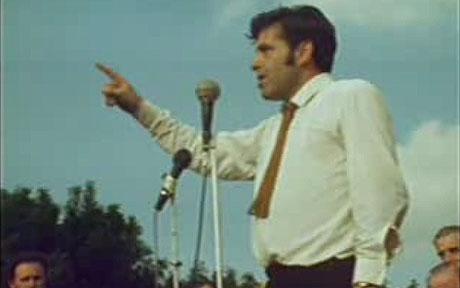A rat race is for rats. We’re not rats. We’re human beings. Reject the insidious pressures in society that would blunt your critical faculties to all that is happening around you, that would caution silence in the face of injustice lest you jeopardize your chances of promotion and self-advancement. This is how it starts, and before you know where you are, you’re a fully paid-up member of the rat pack. The price is too high. It entails the loss of your dignity and human spirit. Or, as Christ put it: “What doth it profit a man if he gain the whole world and suffer the loss of his soul?”
Profit is the sole criterion used by the establishment to evaluate economic activity – from the rat race to lame ducks, the vocabulary in vogue is a giveaway. It is more reminiscent of a human menagerie than human society. The power structures that have inevitably emerged from this approach threaten and undermine our hard-won democratic rights. The whole process is towards the centralization and concentration of power in fewer and fewer hands. The facts are there for all who want to see; giant monopoly companies and consortia dominate almost every branch of our economy. The men who wield effective control within those giants exercise a power over their fellow men which is frightening, and is a negation of democracy.
Government by the people and for the people becomes meaningless unless it includes major economic decision-making by the people and for the people. This is not simply an economic matter; in essence, it is an ethical and moral question, for whoever makes the important economic decisions in society ipso facto determines the social priorities of that society.
From the Olympian heights of an executive suite, in an atmosphere where your success is judged by the extent to which you can maximize profits, the overwhelming tendency must be to see people as units of production, as indices in your accountant’s books. To appreciate fully the inhumanity of this situation, you have to see the hurt and despair in the eyes of a man suddenly told he is redundant, without provision made for suitable alternative employment…someone, somewhere, has decided that he is unwanted, unneeded, and is to be thrown on the industrial scrap heap. From the very depth of my being, I challenge the right of any man or any group of men, in business or in government, to tell a fellow human being that he or she is expendable.
As in other matters, I must ask the politicians who favor these proposals: where and how in your calculations did you quantify the value of a community? Of community life? Of a sense of belonging? Of the feeling of identification? These are rhetorical questions; I know the answers. Such human considerations do not feature in their thought processes.
If modern technology requires greater and larger productive units, let us make our wealth-producing resources and potential subject to public control and social accountability. Let us gear our society to social need, not personal greed. Given such creative reorientation of society, there is no doubt in my mind that in a few years we could eradicate in our country the scourge of poverty, the underprivileged, slums, and insecurity.
Even this is not enough – to measure social progress purely by material advance is not enough. Our aim must be the enrichment of the whole quality of life. It requires a social and cultural – or, if you wish, a spiritual transformation of our country. A necessary part of this must be the restructuring of the institutions of government, and, where necessary, the evolution of additional structures, so as to involve the people in the decision-making processes of our society. The so-called experts will tell you that this would be cumbersome or marginally inefficient. I am prepared to sacrifice a margin of efficiency for the value of the people’s participation.
To unleash the latent potential of our people requires that we give them responsibility. The untapped resources of the North Sea are as nothing compared to the untapped resources of our people. I am convinced that the great mass of our people go through life without even a glimmer of what they could have contributed to their fellow human beings. This is a personal tragedy. It is a social crime. The flowering of each individual’s personality and talents is the pre-condition for everyone’s development.
(Jimmy Reid, from his commencement speech to graduates of Glasgow University, 1972)

